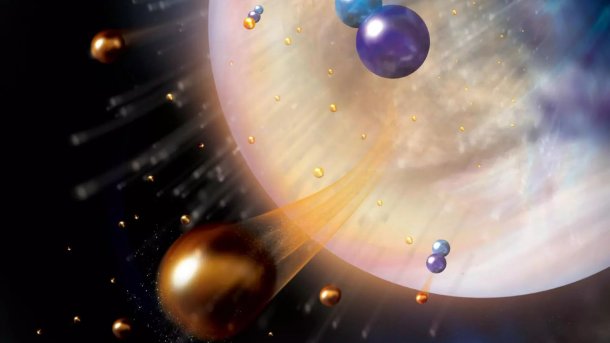Venus: Alleged explanation found for almost complete lack of water
Once there was probably as much water on Venus as on Earth. However, this has now nearly disappeared completely. There is now probably an explanation.

Artistic representation of the escaping hydrogen atoms.
(Bild: Aurore Simonnet/LASP/CU Boulder)
A US research group has allegedly solved a major mystery in planetary research and can explain how Venus lost almost all of its water. According to the University of Colorado in Boulder, the molecule HCO+, which should be abundant in the upper atmospheric layers of the second planet in the solar system, is responsible. So far, however, no probe working there has had instruments on board to detect this molecule. And the planned Davinci probe will not be able to find it either, the research team writes. However, it hopes that a mission will be launched in the future that can search for precisely this substance and thus confirm that it plays a decisive role in the planet's water loss.
Far too little water left
It is actually assumed that Venus received about as much water as our Earth during its formation several billion years ago, the team writes. However, while all the water on our home planet could evenly cover it to a height of 3 km, that of Venus would only be 3 cm high. This immense difference is therefore due to the strong greenhouse effect triggered by clouds of carbon dioxide at some point in the history of Venus. These caused temperatures there to rise to almost 500 degrees Celsius at the surface and evaporate the water present there. Most of this then disappeared from the atmosphere into space. Nevertheless, much more should have been left behind than we now find there.
Using computer models, the research group determined that the sunlight in Venus' atmosphere not only breaks down water vapor molecules on a large scale - as previously thought - but also carbon dioxide. Hydrogen atoms that do not escape directly into space would then react with carbon monoxide to form HCO+, which in turn breaks apart directly to get rid of excess energy. Most of this energy would go to the hydrogen atom, which would then escape into space at high speed, the US science magazine Science quotes co-author Michael Chaffin. This would explain why even more water has been lost and continues to be lost than assumed. If the hypothesis is correct, HCO+ would have to be the most common ion in the atmosphere of Venus.
The study, which has now been published in the journal Nature, once again underlines how much we do not know about Venus. This is also due to the fact that Earth's neighboring planet has been downright ignored in favor of Mars in recent decades. The Japanese probe Akatsuki is currently the only one orbiting Venus, while there are seven orbiting Mars - plus two active rovers. However, several Venus missions are now being prepared again. One of the most ambitious is the NASA probe Davinci (Deep Atmosphere Venus Investigation of Noble gases, Chemistry and Imaging). However, it is not due to be launched until the end of the decade. The disparity has also recently become clear with the alleged discovery of phosphine on Venus, which could not be verified on site.
(mho)